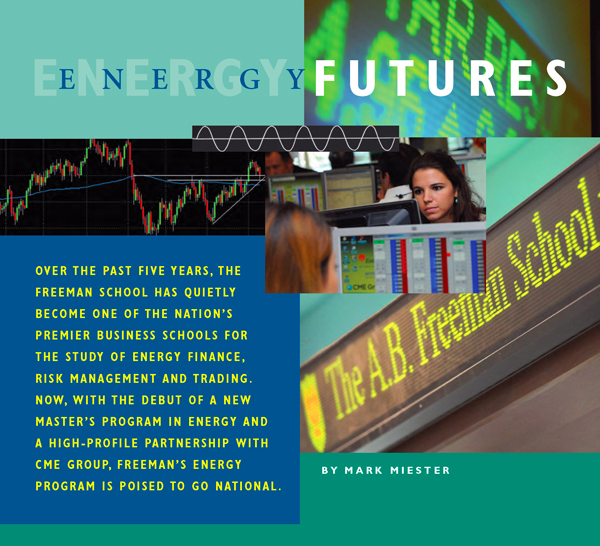When Alicia Ranney (BSM ’11) landed a summer internship on J.P. Morgan’s energy trading desk in Houston, she was a little anxious. A Tulane junior majoring in mathematics and finance, Ranney had developed an interest in energy after taking a few classes in the Freeman School, but an internship at a major trading firm was something new. She didn’t know quite what to expect during the nine weeks she’d spend alongside peers from Duke, Emory, Northwestern and Penn State, and she didn’t know how she’d perform in that stressful, highly competitive environment.
As it turned out, she had nothing to worry about.

Alicia Ranney earned a job offer at J.P. Morgan after impressing supervisors during a summer internship on the firm's energy desk.
“Most of the interns there didn’t know anything about energy,” recalls Ranney. “I already knew what a heat rate was, I already knew how futures contracts work, and I could just go in there and start working right away. The other interns had to read all these books to understand how the natural gas and power industries work.”
The reward for her performance? A job offer with J.P. Morgan’s Houston Commodities Group following her graduation this May.
In the last five years, stories like Ranney’s have become increasingly common. While the Freeman School has long placed graduates in general finance positions with energy companies, a new generation of students is finding success in more specialized roles including energy finance, trading, sell-side analysis and risk management. Thanks to an innovative curriculum and the most realistic trading simulations available anywhere, the Freeman School is showing up on the radars of more and more employers. Companies like ConocoPhillips, Exxon Mobil, Citigroup and Sequent Energy Management—firms that in the past recruited exclusively from a small, select group of schools—have each begun to aggressively target Freeman in recent years. The reason, industry professionals say, is that the Freeman School’s energy program is doing something other programs aren’t: giving students the practical skills they need to hit the ground running at energy, banking and trading firms.
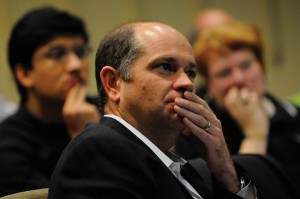
Berney Aucoin, vice president with Sequent Energy Management, has hired four Freeman graduates in the last three years.
“The Freeman School gives students an extra level of practicality,” says Berney Aucoin, vice president at Sequent Energy in Houston. “I’ve had four Freeman graduates join my group over the last three years, and they each came in already understanding the business and the issues, so the speed with which they were able to start contributing to the value of our company was greatly expedited. The practical applications and industry knowledge Freeman graduates bring into the workplace is more advanced than anything I’ve seen before.”
“The investment that Tulane has made into its energy trading program is evident when you speak to the students,” adds Andrew Vo, partner and head of the North American trading practice at Accenture. “The Tulane students are absolutely top caliber, and we at Accenture are very interested in recruiting the next generation of consultants coming out of this program.”
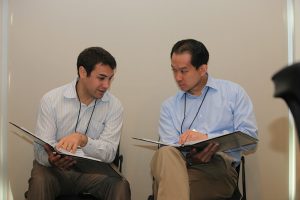
Andrew Vo, right, partner and head of North American trading at Accenture, and Sal Barnes (MBA '10), who joined Accenture as a consultant after earning an energy specialization certificate from the Freeman School.
Comments like those are music to James McFarland’s ears. As executive director of the Tulane Energy Institute, McFarland has overseen the Freeman School’s energy programs and initiatives since 1998, but McFarland’s interest in energy goes back much further. Since earning a PhD in statistics and economics from Texas A&M University in 1971, McFarland has published more than 30 scholarly articles and research reports on energy and natural resources management. From 1975 until 1985, he was a staff member in energy economics and systems analysis at the University of California’s Los Alamos National Laboratory. It was McFarland who made energy a strategic priority of the Freeman School when he was appointed dean in 1988, it was McFarland who in 2000 wrote the proposal to create an institute to coordinate the school’s energy programs, and it was McFarland who in 2003 built an electronic trading room in Goldring/Woldenberg Hall II to give students hands-on experience with energy futures. Most recently—and possibly most significantly—it was McFarland who won approval from the university to offer a new master’s degree program in the business of energy. (See the story on page three.)
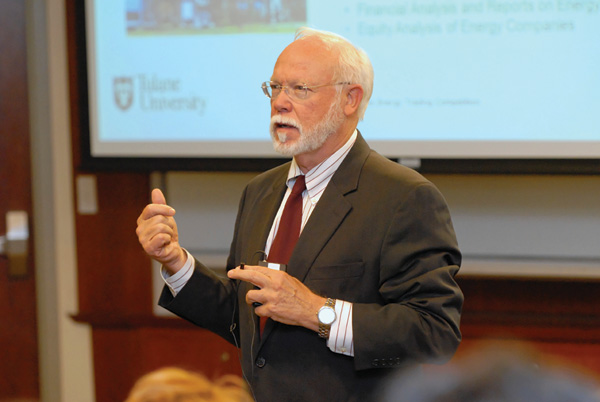
James McFarland, executive director of the Tulane Energy Institute, began assembling the parts of Freeman's current energy program more than a decade ago.
According to McFarland, the energy industry is currently facing the dual challenge of an aging workforce and a rapidly evolving electronic trading environment. The Master of Management in Energy was created to meet the industry’s need for entry-level employees who combine an understanding of energy fundamentals with hands-on experience using the latest electronic trading tools. The intensive one-year program is designed to prepare new or recent college graduates for careers in energy finance, sell-side and buy-side analysis, risk management, consulting and trading.
“There’s no other program like this one,” McFarland says. “There are some executive MBA programs for energy and some Master of Finance programs with energy orientations, but there’s nothing this innovative, creative or well thought out.”
The Master of Management in Energy program isn’t the only big news to come out of the Tulane Energy Institute in recent months. In September 2010, CME Group, operator of the world’s largest derivatives and futures exchanges, selected the Freeman School as its official university energy education partner and provider of energy trading training programs. CME is currently putting the finishing touches on equipment to replicate Freeman’s energy trading simulation at its Knowledge Learning Center in Chicago. Beginning this spring, Freeman School faculty will deliver professional education programs at CME modeled after the school’s energy trading courses.
“One of the reasons that we were initially impressed with the Tulane approach to training was its emphasis on technology, and not just in a theoretical sense but in the sense of the real tools applied by commercial end users,” says John Connolly, associate director with CME Group. “CME Group’s focus is on end users, so in this case our corporate vision and Tulane’s innovations in the area of simulated trading were very much aligned.”
Tulane was also the first university to be offered its own exclusive channel on Reuters Insider, a new Thomson Reuters
information service aimed at business professionals. Reuters Insider features multimedia news, commentary and analysis from Reuters and more than 150 financial information providers. The Tulane channel will feature video content provided by the Freeman School, including analysis from Burkenroad Reports, the school’s nationally renowned equities research program, making the work of faculty and students instantly accessible to an international audience of finance professionals.

Nick DiCosola, vice president with Thomson Reuters, says Freeman's use of technology is unique to both academia and industry.
“We have many other universities that we’re involved with, but our program at Tulane is unique in that it’s a real partnership,” says Nick DiCosola, vice president with Thomson Reuters. “That partnership between the faculty and our staff has enabled Tulane to integrate our products into the curriculum in some really exciting ways, so the day we announced Insider, I was on the phone to Tulane saying this is something you really need to get involved with.”
Most recently, in February the Freeman School announced a partnership with the Energy Management Institute, the leading provider of educational programs, market data and advisory services for energy professionals. Under terms of the agreement, the Freeman School and EMI will collaborate on training seminars for finance and trading professionals that take advantage of Freeman’s expertise in energy finance, risk management and simulated trading.
“There’s a huge need right now for continuing education to bring energy professionals up to speed with the latest technologies,” says Dominick Chirichella, president of the Energy Management Institute. “Tulane leads the way when it comes to energy education and training at the university level, so we’re very excited to be able to add that expertise to EMI’s broad-based education programs for energy professionals.”
While the placement success and high-profile new programs may sound like revolutionary developments, McFarland says the Freeman School has actually been working for more than a decade to put together the pieces of a world-class energy program.
“We’ve been playing in this arena for a long time,” McFarland says. “It’s really been evolutionary.”
If you had to pick a date for when the Freeman School’s current energy program first started to take shape, it would most likely be 1998, when McFarland, then dean, won a grant of $200,000 from the Louisiana Board of Regents to build the school’s first trading room in Goldring/Woldenberg Hall. That modest installation became the prototype for Goldring/Woldenberg Hall II’s Trading Center. Also that year, McFarland hired Peggy Babin as associate dean. Babin, an experienced natural gas trader at Louisiana Land & Exploration Co., shared McFarland’s background in energy and his vision for building a nationally recognized energy program.
A year later, Freeman launched its first MBA concentration in energy finance, which combined traditional accounting and finance classes with energy-specific courses on modeling, energy markets and contracts, and risk management.
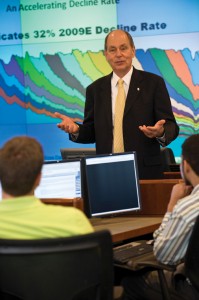
Clinical professor of finance Eric Smith has more than 30 years experience with energy, offshore service and petrochemical companies.
In 2003, the Entergy-Tulane Energy Institute was established with $2.5 million in seed funding provided by Entergy Corp. together with matching funds from the Freeman School. Under terms of the agreement, the institute carried Entergy’s name for its first five years of existence.
One of the first things McFarland did as director of the institute was hire Eric Smith (MBA ’67), a former executive with McDermott International Inc. and other energy and energy-related firms, to work on applied research reports for the institute, including major papers on the potential for importing liquefied natural gas into the U.S. and the use of petroleum coke as a feedstock for power generation. In 2005, Smith joined the institute full time as associate director and clinical professor of finance. In that role, he provides market analysis and economic research on issues affecting the energy sector and teaches the required introductory courses leading to the energy specialization certificate, which in 2006 succeeded the concentration in energy finance. Smith has also become the de facto public face of the institute, serving as an expert commentator on energy-related issues. In the wake of last year’s Deepwater Horizon oil spill in the Gulf, Smith received more than 3,000 media mentions.
“There are a lot of schools doing energy research, but they tend to study energy with an engineering focus,” says Smith. “I think our niche is recognizing that it’s a technical industry but looking at it from a business perspective. There aren’t a lot of schools doing that.”
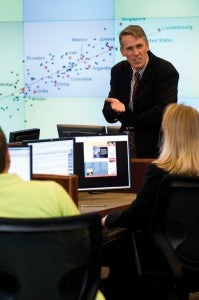
Geoff Parker, associate professor of economic sciences, specializes in energy market structures and performance, energy systems design and efficiency, and platform design and management.
While Smith focuses on applied research, scholars like Geoff Parker and Anjali Sheffrin conduct pure academic research under the Tulane Energy Institute banner. Parker, associate professor of economic sciences and director of the institute, focuses on the economics of business platform strategy, smart grids, outsourced engineering projects and electric power markets. Sheffrin, research professor and former chief economist for the California Independent System Operator, is an expert in market design for wholesale electricity markets, the economics of renewables and regulatory policy. In addition, younger assistant professors Xiaoyue Jiang, Ekundayo Shittu and Burcu Tan contribute research in the areas of electric power market design, energy economics and environmental policy analysis, markets for renewable energy, and modeling and optimization for maintenance systems. All the institute’s research professors also teach, and each will teach a course in the new master’s program.
In the spring of 2007, Peggy Babin called up one of her old colleagues from the energy business, Joe LeBlanc, and asked him to meet her for lunch. At the time, LeBlanc was treasurer and principal financial officer with Energy Partners Ltd., an independent oil and gas company, but prior to that he and Babin had worked together for 14 years at Louisiana Land & Exploration Co., where Babin had managed natural gas trading and LeBlanc had been manager of commodity risk, planning coordinator and audit coordinator.
Over lunch that day, Babin explained to LeBlanc that Freeman had built a high-tech electronic trading floor, but up until then the facility had been used primarily for currency trading and not the purpose for which it was built—to teach energy trading. Babin asked LeBlanc if he’d be interested in taking over the Trading Center and teaching a class or two in trading.
“I told Peggy, ‘I’ve trained a lot of people, but I’ve never taught a class like this. I don’t know,’” LeBlanc recalls. “She said, ‘Come on, Joe. We’ll get you teaching assistants. We’ll get you whatever you need.’
“She sold me!” LeBlanc laughs. “I should have remembered who I was dealing with.”
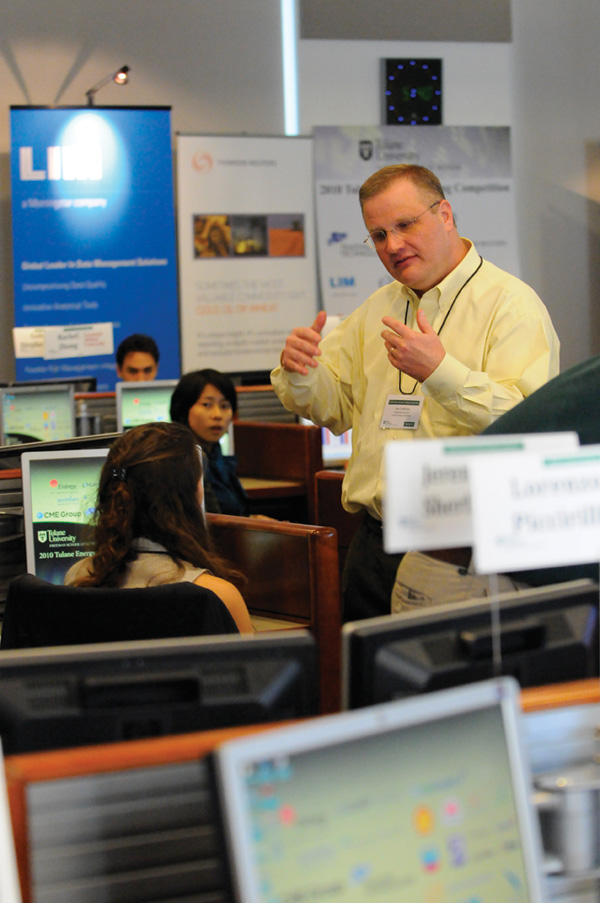
Clinical professor Joe LeBlanc, a former trader with Louisiana Land & Exploration Co., has created electronic trading simulations that industry professionals call the most realistic available anywhere.
Despite still working full time at Energy Partners, LeBlanc began to put together a course in energy trading. The first thing he did was call some of the vendors he’d dealt with over the years to find out what it would take to get their products into the Trading Center. LeBlanc’s strategy was simple: Reach out to vendors that supply the products used on commercial trading floors and teach students how to trade using those products. The students would get the hands-on experience that employers are looking for, and the vendors would get an expanded customer base of young traders with a built-in preference for their products. Thomson Reuters and Trading Technologies, industry leaders in market data and software, each agreed to install their commercia lgrade systems, train students in their use and provide technical support at little or no cost to Tulane. In retail terms, those donations represent an annual value of almost $5 million.
LeBlanc now had the data and software he needed, but there was still the problem of timing. He would be teaching in the evening, and the markets are closed at night. How could students practice reacting to market conditions if the markets were closed? In one of his meetings with vendors, LeBlanc heard Nick DiCosola of Thomson Reuters mention in passing a product the company used to test its Reuters Market Data System on commercial trading floors prior to live trading. The ReplayService, as the product was called, enables an administrator to stream the full range of market data from any trading day in history over the network as if it were live.
A light bulb went off in LeBlanc’s head.
No one had previously used the ReplayService to train students, and no one had previously tried to integrate the Reuters Market Data System and ReplayService with Trading Technologies’ X_Trader software. Working closely with representatives from the companies as well as Kevin Ammentorp of the Freeman School’s technology group, LeBlanc developed a one-of-a-kind simulator that allows an instructor to stream historic market data to students as if it were live so they can test their skills and execute strategies whether the markets are open or closed.
More recently, as part of its partnership with Freeman, CME Group installed a dedicated server at its headquarters to feed data directly to the Freeman School’s Trading Center. Tulane is the only university to have a direct market feed from CME, a feature that enables Freeman to deliver simulations more advanced and sophisticated than many commercial trading firms.
Since going live in the fall of 2007, LeBlanc’s energy trading simulations have enabled more than 400 students to gain real experience trading natural gas and crude oil futures without leaving the classroom. In the fall of 2008, LeBlanc cashed out at Energy Partners and joined the Freeman School full time as a clinical professor of finance and director of the Trading Center.
“Joe has built a very unique program at Tulane,” says Thomson Reuters’ DiCosola. “The things that he’s doing with his simulations are unique certainly to universities, and I think they’re unique in some cases even to the industry.”
“We’ve done a lot with Tulane, but the fact of the matter is we handed them the ball and they ran with it,” adds Leo Murphy, campus manager with Trading Technologies. “Other schools have our software, but they use it in a much more limited capacity.”
The newest addition to the Trading Center is Logical Information Machines (LIM), the industry standard for data aggregation in the energy marketplace. In September 2010, LIM, a Morningstar company, began providing Freeman students with free access to its energy data and analytics. The service includes real-time data feeds from nearly 200 vendors as well as a host of data management and analytical tools. With 220 licenses, the Freeman School is LIM’s largest implementation anywhere. The retail value of the service is more than $5 million per year.
“The version of LIM in the Freeman School’s Trading Center is exactly what you would see on any of the trading desks in Houston, Chicago, New York, London or Singapore,” says Jeff Shipp, sales director with LIM. “The students are going to be trained on exactly what they’re using in real life.”
While students in LeBlanc’s classes were starting to generate a buzz with some recruiters, there were still a lot of employers out there unfamiliar with the work Freeman was doing to train students. In 2009, LeBlanc came up with the idea of hosting an energy trading competition to showcase the Freeman School’s students, programs and facilities to a national audience. In just two years, the Tulane Energy Trading Competition has become one of the nation’s leading annual events for recruiters seeking the next generation of trading talent. Last year, more than 40 industry executives attended the live final round to meet the students and serve as guest judges.
“Students who know how to do what the students are doing in the competition, particularly with the technology that they’re using, can actually slide pretty easily into an organization like mine,” says Dylan Seff, head of North American power and environmental products at Vitol Inc. “Granted we wouldn’t take a student out of this competition and immediately put them down on a trading seat, but to have the basic tool set gives them a leg up.”
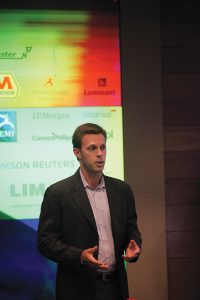
Greg Thurnher, supervisor for transmission strategy with the Electric Reliability Council of Texas, teaches the course Electricity Markets and Trading.
Energy trading is about more than just natural gas and crude oil. It also encompasses electricity. The addition of Gregory Thurnher (E ’02, MBA ’07) to the faculty in the spring of 2008 expanded the curriculum to include power marketing. Thurnher, a former real-time power marketer at Entergy, started out teaching a textbook-based class that focused on regulation and compliance, but the success of LeBlanc’s high-tech simulations led him to create a simulation for the wholesale electricity markets.
“The students’ job is to balance supply with demand in the most economic method possible,” Thurnher says. “To do that, we load in yesterday’s data, and we throw some constraints at them. If there’s a particularly cumbersome day, like the Florida blackout of 2008, we can take that data, pump it into the simulator, and let the students figure out how they can do better.”
Thurnher’s simulation was judged to be so realistic that it has been certified for use in continuing education programs by the North American Electric Reliability Corp. (NERC), a delegate of the federal government charged with ensuring the reliability of the North American bulk power system.
“NERC has recognized that this is up to snuff for the real operators,” says Thurnher, who currently serves as supervisor for transmission strategy at the Electric Reliability Council of Texas (ERCOT) in addition to teaching at the Freeman School.
“For students, it provides a learning experience they can take to industry.”
And students have taken that experience to industry. Since Thurnher joined the faculty, students completing his course have been hired for power marketing positions with Ameren, Florida Power & Light, RBS Sempra, Citibank and J.P. Morgan.
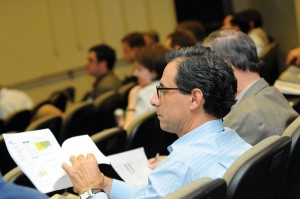
Executive professor John Bertuzzi, a former managing director at Goldman Sachs, says the energy program's emphasis on real-world experience gives Freeman graduates an advantage over peers from other institutions.
In addition to the simulations, one of the major differentiators of Freeman’s energy program is the quality of instructors. From the beginning, the strategy was to combine tenured and tenure-track research professors like McFarland, Parker and Sheffrin with clinical professors drawn from industry like Smith, LeBlanc and Thurnher, but there’s a third category as well: executive professors.
Thanks to the strength of the curriculum and its strong reputation in industry, the Freeman School’s energy program has attracted a number of high-quality executive professors who teach occasional courses and serve as guest lecturers. One of those executive professors is John Bertuzzi, a former managing director at Goldman Sachs and one of the organization’s top energy traders. Bertuzzi has served as a guest lecturer in LeBlanc’s advanced energy trading course, and he is scheduled to co-teach Energy Portfolio Management, a new course offered as part of the Master of Management in Energy program.
“The Tulane program certainly demands that students understand all the theory surrounding the financial instruments utilized in the energy industry, but then it takes it a step further and immerses them in a real-world environment where they actually have to use those financial instruments in live situations,” Bertuzzi says. “All things being equal, if you take a student from Tulane University and a student from XYZ university and put them in a supply, distribution or trading role, there’s a high probability the Tulane student is going to be successful because he or she has already been in effect pre-screened for that environment.”
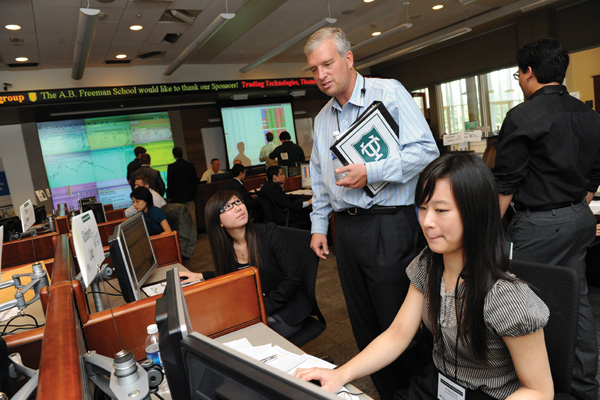
Executive professor Parker Drew, former managing director of commodity sales at RBS Sempra Energy, co-teaches the new course Energy Portfolio Management.
“We’re going to put students in different risk-taking situations to give them what amounts to an on-the-job training program while they’re still in school,” adds Parker Drew, former managing director of commodity sales at RBS Sempra Energy and another of the program’s executive professors. “When they walk in the door as a new hire, they won’t need a long training program. They’ll be able to adapt and start adding to the bottom line much more quickly than other new recruits.”
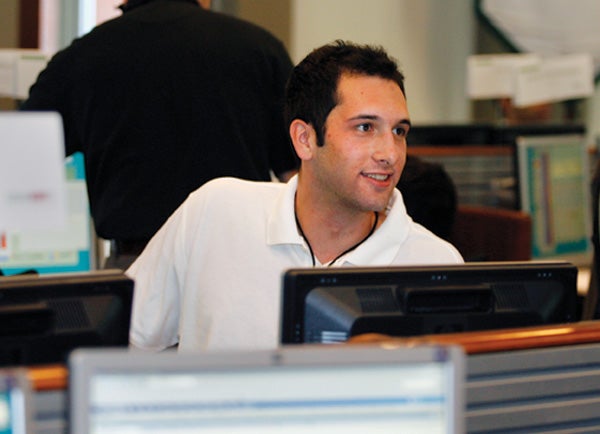
Kellen Hayes (MFIN'10), an energy analyst with Citi Global Commodities, says Freeman's emphasis on experiential learning helps reduce the learning curve at trading firms.
The Freeman formula—a solid foundation of industry fundamentals, real-world simulations using the leading professional trading tools, faculty from both academia and industry, and a strong network of corporate partners—is working. Since 2007, the number of energy firms recruiting Freeman School students has increased dramatically, and the new master’s program promises to expand that number even further.
“The Freeman School’s energy program provides a good understanding of the industry, so a graduate can pretty much go into any job at an energy company,” says Maren Leopold (BSM ’09), an energy distribution coordinator at ConocoPhillips in Houston. “At a lot of companies, you have to work your way up to being a trader, but if you have a solid foundation in energy, you can work your way up in much less time than you would without that background.
“What Freeman’s energy classes do is give you the fundamental knowledge so you have a less steep learning curve,” says Kellen Hayes (MFIN ’10), an analyst with Citi Global Commodities in Houston. “That experience allows you to get to a higher level quicker than if you were in a pure lecture or theoretical class.”
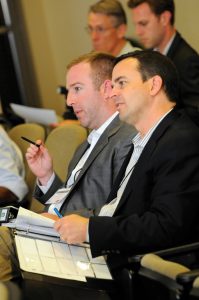
Dylan Seff, left, head of North American power and environmental products at Vitol Inc., and Monte Elliff, director at Citigroup, were judges as the 2010 Tulane Energy Trading Competition.
“The experiential learning that Tulane focuses on is really important to hit the ground running once you’re in the business,” adds Abe Topham (MBA ’08), an analyst in the structuring department at Sequent Energy in Houston. “With Burkenroad Reports, you get experience doing fundamental analysis, cash flow analysis and valuation work, and then with Joe’s class, you get hands-on experience with technologies that are used in the industry. The experiential learning side of the Tulane education was the thing that really helped me.”
While it’s nice to hear graduates sing the praises of the energy program, it’s even nicer to hear praise from employers, the end users of the program.
“We focus a lot of our recruiting efforts on Freeman,” says Vitol’s Dylan Seff. “In fact, once we started recruiting at Freeman, we moved away from some of the universities that are closer to us in Houston. Now we focus probably two-thirds of our recruiting efforts across the U.S. just on Freeman. The Freeman School is doing a great job preparing students for the energy business.”
After more than a decade putting together the right faculty, curriculum, technology and partners, the Freeman School’s energy program is poised to be a powerhouse.

